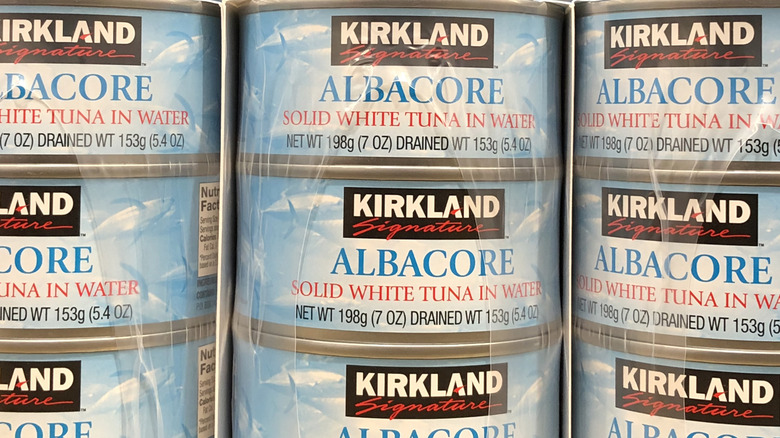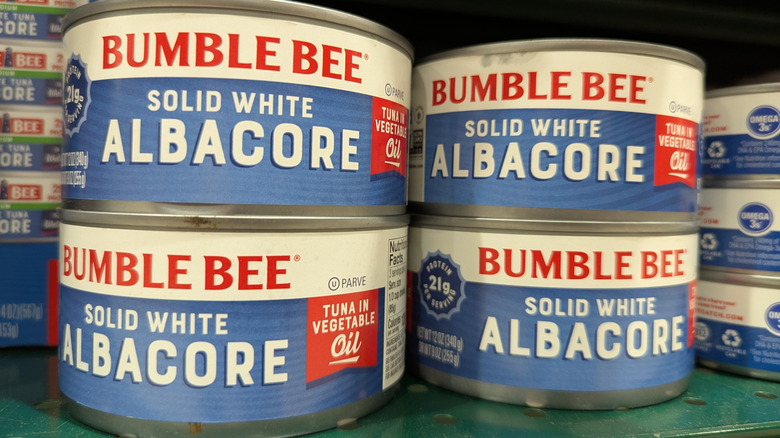What Company Is Behind Costco's Kirkland Canned Albacore Tuna?
Costco's seafood selection is nothing short of impressive. With a coveted membership, you can gain access to a wide array of bulk-buy offerings, from a $15 whole, wild-caught octopus to sushi-grade salmon, and even frozen shellfish favorites like shrimp and scallops. Among these seemingly endless options, one of the simpler yet reliably delicious seafood offerings is its Kirkland canned albacore tuna. The real company behind Costco's supply is a big industry name: Bumble Bee Food.
Even though the canned albacore tuna is sold under the Kirkland brand name — which accounts for 1/3 of Costco's overall sales — Costco doesn't actually source or manufacture many of these products itself. For instance, Kirkland batteries are made by Duracell, and its signature coffee blend is made by Starbucks. Instead, Costco relies on contracts with various, often big-name established suppliers, and this is where Bumble Bee Food come in.
Founded in 1899, Bumble Bee Food are titans of the canned tuna industry and one of the largest seafood companies in North America, holding "the largest market share in the U.S. for canned and poached tuna," (per Seafood Stewardship Index). At Costco, the Albacore tuna is sold in water, making it well-suited for richer recipes such as tuna salads, pasta dishes, or a tuna sandwich. According to Costco's website, the tuna is wild-caught, and each seven-ounce can contains 42 grams of protein, making it a nutritious and convenient option for those looking for a quick, no-stress meal.
The controversy behind Bumble Bee Seafood
As the company behind the biggest tuna recall in history, Bumble Bee Food is no stranger to controversy. In recent years, it has amassed significant criticism concerning unsustainable fishing practices. In 2019, for instance, Bumble Bee Food was sued by consumers for violating the Dolphin Protection Consumer Safety Act, allegedly falsely advertising its tuna as dolphin safe, with evidence suggesting that its suppliers' fishing practices were putting dolphins at risk, including controversial methods such as longline fishing. Longline fishing uses long lines of baited hooks to catch fish, and these lines can be 50 to 100 kilometers long.
According to Greenpeace, this practice is particularly destructive, and can put a variety of endangered species at risk: "...longlining is not a very selective fishing method and often results in significant bycatch. This includes a range of non-target species like sharks, rays, sea turtles, marine mammals, and seabirds." Adding to its legal troubles, in 2025, Bumble Bee Food faced a high-profile lawsuit brought forward by four Indonesian workers. The plaintiffs alleged they were subjected to unsafe working conditions, forced labor, and physical abuse while aboard a Taiwanese fishing vessel that supplied tuna to the company.
They further claimed that the company's actions violated U.S. human trafficking laws, prohibiting individuals or companies from benefiting financially from forced labor. This case highlights a wider environmental and social issues prevalent within the seafood industry, which involves U.S.-based seafood companies profiting from seafood sourced from countries with less legislation in place prohibiting forced labor, unsustainable fishing practices, and unsafe fishing conditions.


